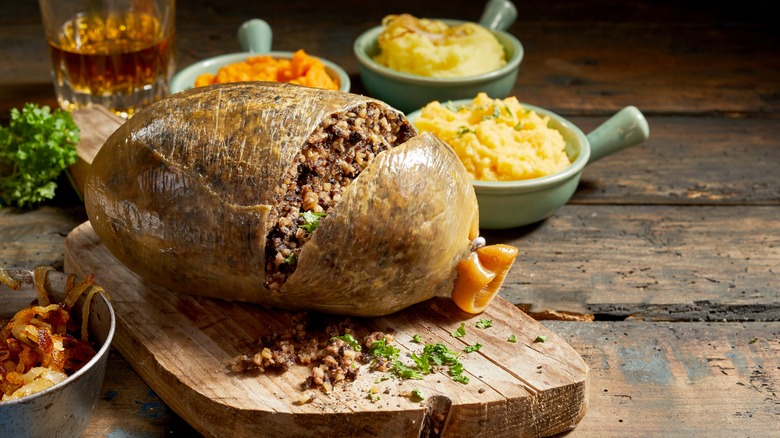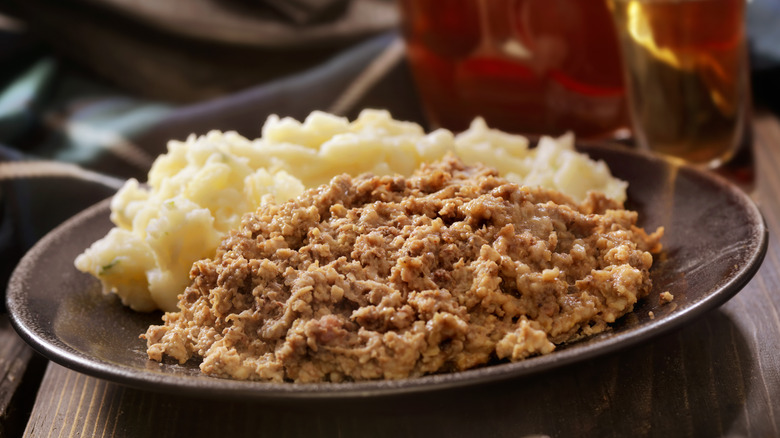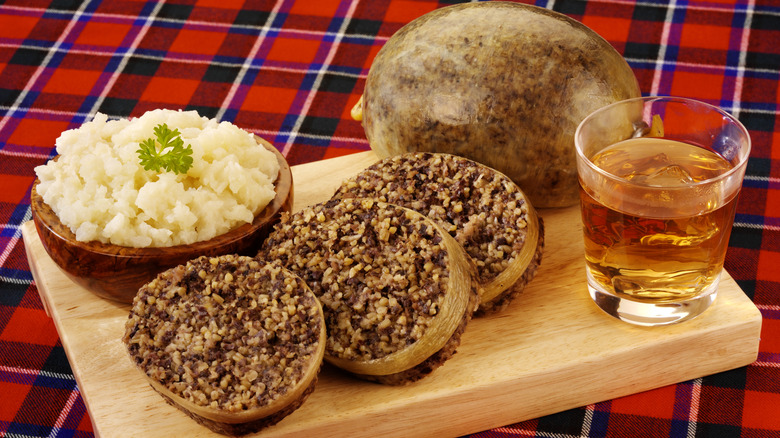Why Haggis Is Banned In The US
If you're unfamiliar with haggis — as many Americans seem to be — it's a savory pudding made with various sheep parts and is Scotland's national dish. So beloved is haggis in its country of origin, in fact, that iconic Scottish poet Robert Burns once wrote an ode in its honor. "Fair fa' your honest, sonsie face, / Great Chieftain o' the Puddin-race!" Burns declared about the delicacy in his 1786 poem, "Address to a Haggis." Naturally then, when Burns Night suppers are held each year to mark the day of the poet's birth (January 25), haggis is a featured dish. At least, on one side of the Atlantic Ocean, that is.
Those in the U.S. who'd like to try the dish are out of luck — assuming they want to try a haggis made with its traditional ingredients. It was long illegal to import the dish from its ancestral home of Scotland, and Americans have been forbidden by law from making dishes that include sheep lungs since 1971. There are plenty of international foods you can't experience in the U.S., in fact. Yes, haggis' list of ingredients includes sheep lungs, as well as the animal's heart and liver. These organ meats (aka sheep pluck or offal), along with oatmeal, suet, and seasonings, are then boiled inside a sheep's stomach to produce the famed pudding.
What's bad about eating sheep's lung
It may seem, based on the ingredients list, that omitting one ingredient isn't so horrible — but no Scot would consider haggis truly to be haggis without it. But what's so bad about sheep lung that we can't eat it when people in Scotland seemingly can't get enough of it? It doesn't seem to do them any harm, either. The Scottish have a similar life expectancy to Americans (per the National Records of Scotland). Slightly better, in fact, based on recent data (via Harvard).
Actually, it's not just sheep lungs that are banned in the States. American regulations forbid the eating of lungs from any livestock. This stricture stems from side effects caused by the slaughtering of these animals. Namely, that fluids from other parts of the body, like stomach acids, end up trapped in the lungs, due to an acid-reflux-like reaction. Livestock lungs, it should be noted, also have a larger presence of microorganisms and environmental toxins than other organs.
Are Americans being unjustly deprived of haggis?
For those who've vacationed in Scotland and developed a genuine appreciation for haggis — as well as the 30 million or so U.S. citizens who claim Scottish heritage — there is good news on the horizon. Although representatives from Great Britain have been urging U.S. officials to lift the import ban on haggis since at least 2014, it was only rather recently (December 2021, to be exact) that the Biden Administration actually did so. This agreement has paved the way for the specialty item to finally be shipped from Scotland to America again, something that hasn't been possible in more than 50 years.
However, due to a number of reasons, it hasn't happened yet. One problem for Scottish haggis makers like Macsween, which has evinced an interest in the U.S. market, is that it has also been dealing with issues at home (like Brexit and the coronavirus pandemic). So it's still working on establishing relationships with U.S. purveyors. There's also the issue of slightly tweaking the recipe. Yes, the U.S. law against eating lungs is still in effect.
A few revelers may rue the absence of sheep lung in the distinctive pudding, but haggis imported to Canada since 2017 have also lacked that ingredient, and sales have been robust nonetheless. However this is resolved, it's best to get ready to order your haggis and pair it with a Scottish whisky.



